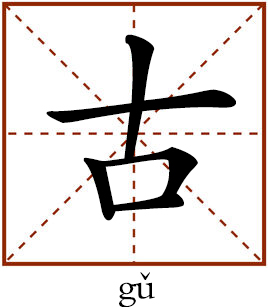Ancient

This character means “old,” “classic” or “ancient.” It usually describes something that belongs to an earlier period of time, or something that makes us think of an earlier time period.
人生自古谁无死
rén shēng zì gǔ shuí wú sǐ
Ren sheng refers to life. Zi gu means “since the ancient times.” Shui means “who.” Wu means “not” and si refers to death. This term means that death comes to everyone.
This is the first line from the poem, “Passing by Lingdingyang,” by Wen Tianxiang (1236–1283), a Chinese poet and politician in the late Southern Song Dynasty. Lingdingyang refers to the Lingding Channel, the middle channel of the Pearl River estuary which runs from Humen, Guangdong province, to Hongkong and Macao. In 1278, Wen was captured by the invading Yuan armies in a battle in Guangdong Province and was imprisoned in a ship passing through the Lingding Channel. Wen was “offered” a post in the Yuan court and was ordered to convince the remaining Song forces to surrender. He refused both and suffered for four years in a military prison before his execution in 1283. In prison he wrote the famous poem, “Passing by Lindingyang.” “I’ve taken pains reading classics to be an official,/ Four bleak years have been spent in thick battles./ Our land is broken like catkins drifting in the wind,/ I roam here and there as duckweed buffeted by the rain./ How panic-stricken I was retreating before the Tartars!/ Being a captive, I lamented over my solitary confinement./ Who can avert his death since time immemorial?/ Let my heart remain true to shine in the annals.” (trans. Huang Xinqu)
Wen recalled his life in the first half of the poem, expressing that the fate of individuals had always been closely linked to the fate of the state. He felt like duckweed sinking or swimming in the rain, as his motherland had turned into a war-torn land. The last two lines are the most famous lines of the poem, revealing his willingness to sacrifice himself for his country. For his resistance to Kublai Khan’s invasion of the Song, and for his refusal to yield to the Yuan Dynasty despite being captured and tortured, Wen is a popular symbol of patriotism and righteousness in China. He is considered one of the three heroes of the Song’s last years, alongside Lu Xiufu and Zhang Shijie.
edited by REN GUANHONG
